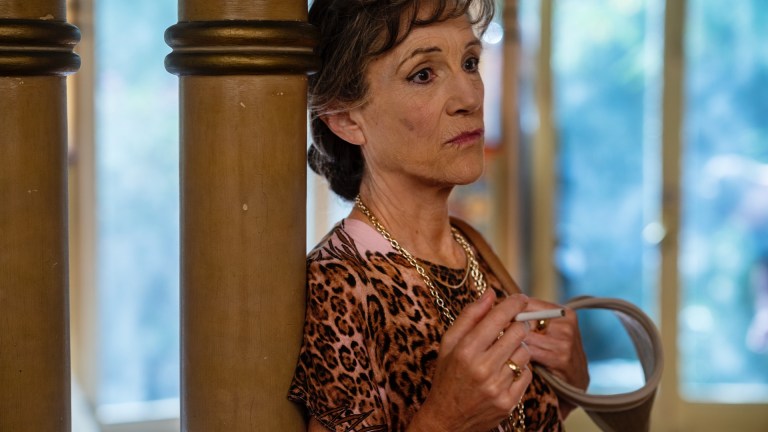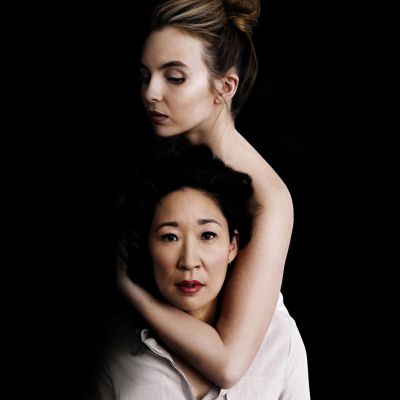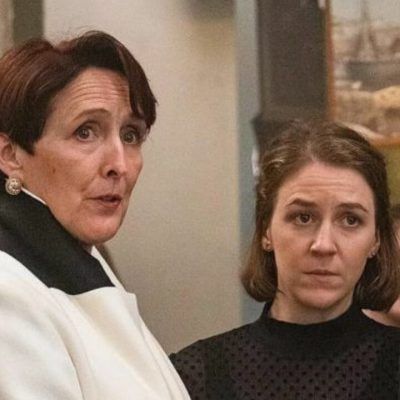Killing Eve Season 3: Harriet Walter on the ‘Pretty Unusual’ Dasha
Dame Harriet Walter discusses what it’s like to serve as Villanelle’s latest handler as Dasha on Killing Eve Season 3.

The following contains spoilers for Killing Eve season 3.
Plenty of us deal with Imposter syndrome, or the psychological concept in which one doubts their accomplishments and fears they will be exposed as a fraud. Usually this pattern of thinking can be quickly exposed as illogical, as anyone thoughtful enough to even worry about not being qualified for a job is almost certainly qualified based on that concern alone.
Still, Imposter syndrome persists in the most unlikely of places…up to and including one of the most successful British actors of her era. Dame Harriet Walter is kind of a big deal. They don’t hand the title of “Dame” out just to anyone, you see. Walter has been acting since 1974 and is well-known for her prolific Shakespeare work, including portraying Brutus in Julius Caesar, Henry IV in Henry IV, and Prospero in The Tempest as part of an all-female Shakespeare trilogy in 2016.
Beyond that, Walter has had a remarkable career in film and television starring in Babel, Atonement, Downton Abbey, The Crown, and more. Even with all that success, however, Walter couldn’t help but be intimidated in joining pop culture juggernaut Killing Eve for its third season and working alongside Villanelle actress Jodie Comer.
“To begin with, I was aware of ‘God, this is an award-winning performer. This is a young, genius star and I don’t know if I’m going to be able to play alongside her,’” Walter says.
As it turns out, Watler was indeed able to play alongside Comer just fine, hopefully putting another nail in Imposter syndrome’s already nail-ridden coffin. In Killing Eve season 3, Walter plays Dasha, a Russian gymnast-turned assassin, who seems to have helped create the Eastern European femme fatale archetype that Villanelle uses to her professional advantage today. The two women have a history together, as evidenced by Villanelle attacking Dasha when she turns up at her wedding. Now the pair have settled into a more traditional handler-killer relationship that Killing Eve has enjoyed through each of its three seasons.
We spoke with Walter to discuss Dasha, Villanelle, and why gymnasts aren’t that different from international assassins.
DEN OF GEEK: What it was like to get this role? Were you a fan of the show previously and what was it like to join a show going into its third season where the cast is already fairly well established and know each other?
DAME HARRIET WALTER: It’s a mixed blessing. I mean it was wonderful to have seen the show because you absorb the sense of the style. There’s a sense of “I know what key the music is in, I can join in.” On the other hand, of course joining in means you’re kind of toeing the line a bit. You think ‘how much can I diverge from this setup? How much leeway do I have as a character to be a bit different?’
As that turned out, that wasn’t a problem because the character herself is pretty unusual. So I just got on with the job and everybody was very welcoming. To begin with, I’d been in awe because you think, ‘God, they’ve done such a good job and they’re so confident and they know their character works and they’ve won awards. I’m coming in and I don’t have a clue.’ But once you’re over that, everybody’s pretty nice. I knew quite a lot of the cast anyway. So it wasn’t a problem. It was actually like riding a wave that they’d all built up.
When you first signed up for this, how much did they tell you about Dasha’s history? And then in relation to that, what was it like to read that first scene that involves your character but that you would not be performing?
That was all great because I got a full breakdown of my character’s history. I didn’t know so much what was going to happen in upcoming episodes. So that was all a bit of a bite your nails and wonder what you’re going to have to do next. But it was great. It was very important to get to make myself similar to the young actor playing me, to know that that was always going to be something that the makeup and the costume and everybody would be aware of that we needed to make it very clear fairly early on that this was the same woman. And the viciousness of that first kill instantly. That’s obviously the turning point in her life and indicated what was at the heart of her, which was some kind of desperation to succeed at the expense of any love affairs or soft heart or vulnerability around her. She was just going to kill anybody who softened her heart.
How do you go about nailing down that accent? Because there’s a lot of accent work already on the show with Jodie already but I think Dasha really kicks it up a notch.
Well, it may be too much, but I am a bit of a linguist myself. I speak Spanish, French, Italian, and I’ve been studying Russian way harder than the other three. But what I did know already was that learning a language is not just finding a neutral way of saying what you would say in English. You actually think differently in a different language. You construct thoughts differently and you express yourself in your body language differently. So it’s a bit like finding a completely different character. For an actor it’s great to act in another language and another accent, because actually instinctively you do all sorts of things that you didn’t write down on paper. They just come as a package with the accent. Then you have to worry that you’re not playing a cliché. But I think the character was written in such a way that I could avoid that anyway.
That is interesting – the notion that different languages make you even think differently. I just found out recently that in Mandarin there’s no verb conjugations. Everything is just in the present.
Well you see there’s a perfect example. The Russians don’t have articles, they don’t say “the” or “a.” I found myself knocking the “the’s” and the “a’s” out my speeches with the permission of the writer. But that’s because they don’t feel a necessity or something in their language needs. So they don’t need to specify whether it’s The Three Sisters by Chekov or any old three sisters by Chekov.
To that end, what is it like to work with Jodie? Because that’s who you share the vast majority of your screen time with and you’re both doing the accent.
I always make use of whatever the reality is to sort of plug myself into the reality of the here and now onscreen. To begin with, I was aware of “God, this is an award-winning performer. This is a young, genius star and I don’t know if I’m going to be able to play alongside her.” I had those thoughts. And then I thought, well that’s useful for Dasha. She’s thinking “I’m being challenged by this very competitive assassin who is not playing by my rules all the time.”
And it’s like I bred her, but she’s flying the coop and going her own way. I used that to begin with, But Jodie’s a real egalitarian and we just…we were equals mostly, we just had a laugh. I mean it sounds cheap and easy, but we did have a lot of giggles. And at the same time she’s absolutely possible to talk very seriously about various things we were planning to do in the scene. So she’s a real collaborator and very mature for her age and I’m quite young for my age, so we got along there.
There’s an interesting contradiction I think for Dasha because early on she tells Villanelle that she wants to go home. She’s taking on this job as they’ll finally send her back to Russia. But then she’s also still clearly prideful that they still study her kills in assassin school. I’m wondering if you could talk a little bit about that inherent contradiction.
I think she’s reached an age where she wants to retire on a heap of glory. She wants some sort of massive farewell or welcome reception that she wants to go back to Russia, be welcomed as a long lost heroine, have replays of all her highlights on TV, and retire to eat a lot of cake. I think that’s what she would like to do. But she feels she still hasn’t had the recognition. She still hasn’t got what she wants. She still doesn’t have the power she needs. She’s still having to play out these last tasks. And that gives her a desperation because she really has been told by The Twelve that if she can get Villanelle back on board, then she can be rewarded and go back to Russia. The fact is that she would not go back to a hero’s welcome, but maybe she never needs to find that out. It’s a fantasy.
What was it like to film in Barcelona? Because it looks spectacular. And what does it add to the scenes?
Oh God, I love filming in the real place. Sitting outside in a square and having all the people passing by be real Spaniards. Rather than calling up a few people at the BBC and saying, “Can you pretend to look Spanish?” I mean, I love being in the real country. And quite apart from anything else, it’s a fascinating town, Barcelona. It really is. It’s such a brilliant mixture of a very sophisticated city – something with real artistic history, a real Bohemian feel- with a kind of real beach life for young people. It’s an incredible place. We were right there in the middle of the city and we could walk everywhere or bicycle everywhere. We don’t get many holidays if you’re a busy actor, but sometimes you just use the location you’re filming in as your holiday place. And that’s what I kind of did with Barcelona.
I like that Dasha keeps up her gymnastics teaching racket by day. It almost seems like the show is implying that gymnastics and killing people almost seem to involve a certain, a similar level of commitment.
I think the Olympics are about being first. Gold medal is it. I think she has some desperate, deep drive to be on top of everything. And that can come from feeling that if I’m not on top, someone else who’s going to get me. She’s a real kill or be killed person. And I think that mentality powers her.


